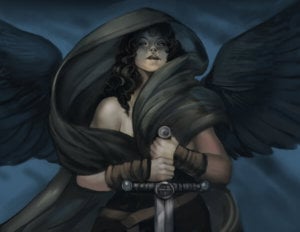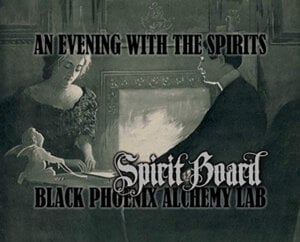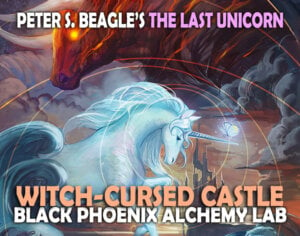Redwood
-
Aeronwen Perfume Oil
Add to cartFig, dark myrrh, amber, redwood, nutmeg, tarragon, black musk, and sweet orange.
-
Spirit Board 2024 Perfume Oil
Out of StockCRAZED THROUGH “OUIJA”
Neglected by Her Lover She Seeks Comfort of a Fortune-Telling DeviceBRIDGEPORT, Conn., Nov. 20.— Mrs. Eugenia Carpenter, a young woman living at 221 Myrtle, av., has been receiving attention from a young man who very recently ceased to call upon her.
Mrs. Carpenter bought a fortune-telling board called “ouija,” and from it received the prediction that her suitor would not return to her.
Last night she was found wandering almost nude in the streets.
Her reason was gone and at intervals she cried out “Ouija said so and I knew it was true.”Boston Daily Globe, November 21st 1891
Redwood and bois de rose with white lilac, dried pink roses, and black tea. -
Witch-Cursed Castle Perfume Oil
Add to cartYou whom Haggard holds in thrall,
Share his feast and share his fall.
You shall see your fortune flower
Till the torrent takes the tower.
Yet none but one of Hagsgate town
May bring the castle swirling down.Beyond the town, darker than dark, King Haggard’s castle teetered like a lunatic on stilts, and beyond the castle the sea slid. Drinn stopped him as he raised his glass. “Not that toast, my friend. Will you drink to a woe fifty years old? It is that long since our sorrow fell, when King Haggard built his castle by the sea.”
“When the witch built it, I think.” Schmendrick wagged a finger at him. “Credit where it’s due, after all.”
“Ah, you know that story,” Drinn said. “Then you must also know that Haggard refused to pay the witch when her task was completed.”
The magician nodded. “Aye,” and she cursed him for his greed – cursed the castle, rather. “But what had that to do with Hagsgate? The town had done the witch no wrong.”
“No,” Drinn replied. “But neither had it done her any good. She could not unmake the castle – or would not, for she fancied herself an artistic sort and boasted that her work was years ahead of its time. Anyway, she came to the elders of Hagsgate and demanded that they force Haggard to pay what was due her. ‘Look at me and see yourselves,’ she rasped. ‘That’s the true test of a town, or of a king. A lord who cheats an ugly old witch will cheat his own folk by and by. Stop him while you can, before you grow used to him.’” Drinn sipped his wine and thoughtfully filled Schmendrick’s glass once more.
“Haggard paid her no money,” he went on, “and Hagsgate, alas, paid her no heed. She was treated politely and referred to the proper authorities, whereupon she flew into a fury and screamed that in our eagerness to make no enemies at all, we had now made two.” He paused, covering his eyes with lids so thin that Molly was sure he could see through them, like a bird. With his eyes closed, he said, “It was then that she cursed Haggard’s castle, and cursed our town as well. Thus his greed brought ruin upon us all.”
In the sighing silence, Molly Grue’s voice came down like a hammer on a horseshoe, as though she were again berating poor Captain Cully. “Haggard’s less at fault than you yourselves,” she mocked the folk of Hagsgate, “for he was only one thief, and you were many. You earned your trouble by your own avarice, not your king’s.”
Drinn opened his eyes and gave her an angry look. “We earned nothing,” he protested. “It was our parents and grandparents whom the witch asked for help, and I’ll grant you that they were as much to blame as Haggard, in their way. We would have handled the matter quite differently.” And every middle-aged face in the room scowled at every older face.
One of the old men spoke up in a voice that wheezed and miaowed. “You would have done just as we did. There were crops to harvest and stock to tend, as there still are. There was Haggard to live with, as there still is. We know very well how you would have behaved. You are our children.”
Weed-strewn oak, opoponax, wet stone, creaking redwood, and desolate olibanum.


